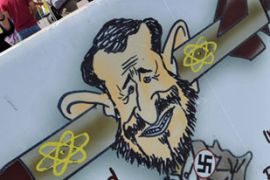Iran poll result ‘harms US hopes’
Ahmadinejad’s victory likely to stall attempts at dialgoue between Washington and Tehran.

“In Washington there was a severe wish to make sure Mousavi [Ahmadinejad’s reformist rival] would be the winner because of the atmospherics and the comfort level in not dealing with Ahmadinejad and dealing with him,” Trita Parsi, the president of National American Iranian Council, told Al Jazeera.
‘Robust debate’
Before the results started to come out, Obama said that he was excited about the debate taking place in Iran and he hoped it would help the two countries to engage “in new ways”.
| Iran election 2009 |
|
In video:
|
“Whoever ends up winning the election in Iran, the fact that there’s been a robust debate hopefully will help advance our ability to engage them in new ways,” he said.
However, Rami Khoury, the editor-at-large of Lebanon’s Daily Star newspaper, told Al Jazeera that the decisive victory could have been a reaction to widely-stated Western hopes for a reformist win.
“They probably didn’t like the fact that this was being portrayed in the international press … as though Obama’s speeches were changing the Middle East,” he said.
“This tells us that Tehran is not Tennessee, there is a difference in how things happen.
“The US doesn’t know what is going on in Iran because it doesn’t have anybody there,” Khoury said.
“It has no officials, it has had no contact with Iran officially for 30 years, so there is a huge gap in knowledge of the basic sentiments of the Iranian people or the leadership.”
Mutual respect
Ahmadinejad has previously said that Iran would welcome talks with the US, but only if there was mutual respect between the two nations.
Officials in Tehran have said that means the accusations that Iran is seeking to build nuclear weapons and supports terrorism must stop.
In March, Obama made a speech to mark Nowruz, the start of the Persian New Year in which he called for a “new beginning” to relations and stressed his respect for the Iranian people.
But Ayatollah Ali Khameini, Iran’s supreme leader, dismissed the message saying that the US still had to show it had changed its attitude towards the country.
Hady Amr, a political analyst at the Brookings Institute, told Al Jazeera that he expected the Obama administration to give Ahmadinejad’s second-term government another chance to respond to such overtures.
“If they don’t respond, the policy could change around the New Year,” he said.
Israeli reaction
Meanwhile, Washington’s main ally in the region, Israel, said that the re-election of Ahmadinejad underlined the fact that the international community must act to stop Iran from acquiring nuclear weapons.
|
“If they don’t respond, the policy could change around the New Year” Hady Amr, |
“If there was a shadow of hope for a change in Iran, the renewed choice of Ahmadinejad expresses more than anything the growing Iranian threat,” Danny Ayalon, Israel’s deputy foreign minister, said in a statement.
Yigal Palmor, a spokesperson for the Israeli foreign ministry, told Al Jazeera: “The challenge that Iran poses to the international community does not rest on personality.
“It stems from its policies. A policy of obtaining at all costs nuclear weapons, a policy of promoting violence and terrorism throughout the region… This is something that should stop. It really doesn’t matter who the president is.
“All the international community should concentrate on making Iran a friendly country … to its neighbours and the region.”
However, Afshin Molavi of the New America Foundation think-tank told Al Jazeera that there were many in the Israeli government who might welcome the outcome.
“In many ways, Mahmoud Ahmadinejad, for many folks in Tel Aviv who would like to see a serious confrontation with Iran over its nuclear programme, is a gift because of his outlandish statements about the Holocaust,” he said.
“I would imagine that Prime Minister Binyamin Netanyahu is not unhappy with these results.”
Israeli officials have repeatedly stressed the need for the US and its allies to act to prevent Iran from building atomic weapons. Tehran says that its nuclear programme is purely to meet civilian energy needs.

